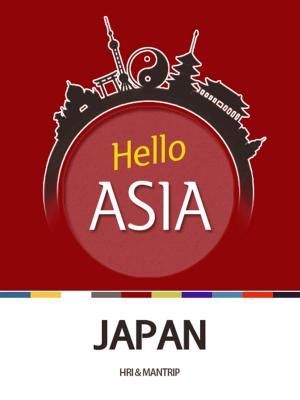Cultures and Symbols of Asia
Nonfiction, Social & Cultural Studies, Social Science, Cultural Studies, Customs & Traditions, History, Asian, Asia| Author: | HRI | ISBN: | 9791186223451 |
| Publisher: | Mantrip | Publication: | December 31, 2015 |
| Imprint: | Language: | English |
| Author: | HRI |
| ISBN: | 9791186223451 |
| Publisher: | Mantrip |
| Publication: | December 31, 2015 |
| Imprint: | |
| Language: | English |
A big continent that accounts for nearly 1/3 of the world's lands - Asia. Different countries in Asia hold different "national symbols" and "cultures" that appear similar to each other. Why don't we expand our perspectives through the symbols and anecdotes behind the landmarks of each country and the customs of specific cultures? First, we start with anecdotes behind the representative symbols and culture of Japan, the country that values courtesy and practical substances.
Why did China use "pandas" to solve diplomatic issues? Why do Chinese people especially love "Guan Yu" among many characters from "The History of Three States"? As the proverb "Everything is determined by the 'kuanxi' (relationship)", Chinese people value humanly relationships based on trust. Let's explore more about China, the country that pursues both faith and practical interests.
What is the reason behind elephants being considered as sacred and mystical creatures in Thailand? It is because the virtues required by almost every religion can be found in the characteristics of elephants. Thailand is a true Buddhist country with millions of Buddhist temples and monks respected as mental leaders. Let's learn about Thailand, the Buddhist country that prioritizes Bukun and courtesy.
It is a well known fact that India worships "cows". People respect the cows to let them go first anywhere and everywhere. Why do Indians consider cows, especially female cows sacred? The answer is in the doctrine of reincarnation of Hinduism. We now take a look at India, the country of Hinduism that worships cows.
In Indonesia, the phrase "kira-kira" can be easily heard, meaning "about, approximately and roughly." Composed of 13,000 islands, Indonesia has a variety of ethnicities and religions, with unique customs for each island. This social and natural environment can only be united when there exists clear commonalities or when each and every culture is appreciated as it is. As the word of compromise stemmed from national tolerance and the phrase that reflects the value system of the Indonesian people, kira-kira has played the role. Now, we look at Indonesia, the country that pursues harmony in diversity.
Vietnamese people tend to be gentle yet show strong independence. Also, rather than saving face, they focus on practical interests and prioritize reality to the past. Let's explore the representative symbols and culture of Vietnam, the country that values practicality and reality.
More than 85% of the Nepal population believes in Hinduism and less than 10% believes in Buddhism. Still, Nepal derives sanctity from the harmony of the two religions symbolized by the living goddess "Kumari". This is extremely different from other religions that worship imaginative entities. Nepal, the country that respects the sacredness of every soul, will be closely examined now.
Australia is a country that loves nature as to insert its specialty animals such as kangaroos and emus into the national crest, while pursuing convenience of civilization. This culture is deeply influenced by the philosophy of the native tribe "Aborigine" who conformed to nature and did not hunt more than needed. Thus, diverse rare animals in Australia have been able to live in harmony with human beings for such a long time. Let's learn more about Australia, the country where nature and human coexist in harmony.
In New Zealand, there is the aggressive yet peace-loving "Maori" native tribe. At war times, the Maori tribe shaked their bodies in an aggressive posture while sticking their tongues out to scare the enemies. Since the 20th century, this has become one of the best known tourist attractions of New Zealand. Now, we shall look into the details of New Zealand, the country of the Maori culture and the grand nature.
Koreans indeed think that the symbolic animal of Korea is the tiger. As there is a saying that goes, you look alike when you live together, Koreans have lived with tigers for a long time to congest the spirit of tigers ourselves. We have learned the "quickly" habit from their brave and swift actions, and the vigorous and confident disposition from their pride that wouldn't touch grass even when starving. At last, we learn more about Korea, the country with the spirit of tiger.
A big continent that accounts for nearly 1/3 of the world's lands - Asia. Different countries in Asia hold different "national symbols" and "cultures" that appear similar to each other. Why don't we expand our perspectives through the symbols and anecdotes behind the landmarks of each country and the customs of specific cultures? First, we start with anecdotes behind the representative symbols and culture of Japan, the country that values courtesy and practical substances.
Why did China use "pandas" to solve diplomatic issues? Why do Chinese people especially love "Guan Yu" among many characters from "The History of Three States"? As the proverb "Everything is determined by the 'kuanxi' (relationship)", Chinese people value humanly relationships based on trust. Let's explore more about China, the country that pursues both faith and practical interests.
What is the reason behind elephants being considered as sacred and mystical creatures in Thailand? It is because the virtues required by almost every religion can be found in the characteristics of elephants. Thailand is a true Buddhist country with millions of Buddhist temples and monks respected as mental leaders. Let's learn about Thailand, the Buddhist country that prioritizes Bukun and courtesy.
It is a well known fact that India worships "cows". People respect the cows to let them go first anywhere and everywhere. Why do Indians consider cows, especially female cows sacred? The answer is in the doctrine of reincarnation of Hinduism. We now take a look at India, the country of Hinduism that worships cows.
In Indonesia, the phrase "kira-kira" can be easily heard, meaning "about, approximately and roughly." Composed of 13,000 islands, Indonesia has a variety of ethnicities and religions, with unique customs for each island. This social and natural environment can only be united when there exists clear commonalities or when each and every culture is appreciated as it is. As the word of compromise stemmed from national tolerance and the phrase that reflects the value system of the Indonesian people, kira-kira has played the role. Now, we look at Indonesia, the country that pursues harmony in diversity.
Vietnamese people tend to be gentle yet show strong independence. Also, rather than saving face, they focus on practical interests and prioritize reality to the past. Let's explore the representative symbols and culture of Vietnam, the country that values practicality and reality.
More than 85% of the Nepal population believes in Hinduism and less than 10% believes in Buddhism. Still, Nepal derives sanctity from the harmony of the two religions symbolized by the living goddess "Kumari". This is extremely different from other religions that worship imaginative entities. Nepal, the country that respects the sacredness of every soul, will be closely examined now.
Australia is a country that loves nature as to insert its specialty animals such as kangaroos and emus into the national crest, while pursuing convenience of civilization. This culture is deeply influenced by the philosophy of the native tribe "Aborigine" who conformed to nature and did not hunt more than needed. Thus, diverse rare animals in Australia have been able to live in harmony with human beings for such a long time. Let's learn more about Australia, the country where nature and human coexist in harmony.
In New Zealand, there is the aggressive yet peace-loving "Maori" native tribe. At war times, the Maori tribe shaked their bodies in an aggressive posture while sticking their tongues out to scare the enemies. Since the 20th century, this has become one of the best known tourist attractions of New Zealand. Now, we shall look into the details of New Zealand, the country of the Maori culture and the grand nature.
Koreans indeed think that the symbolic animal of Korea is the tiger. As there is a saying that goes, you look alike when you live together, Koreans have lived with tigers for a long time to congest the spirit of tigers ourselves. We have learned the "quickly" habit from their brave and swift actions, and the vigorous and confident disposition from their pride that wouldn't touch grass even when starving. At last, we learn more about Korea, the country with the spirit of tiger.















